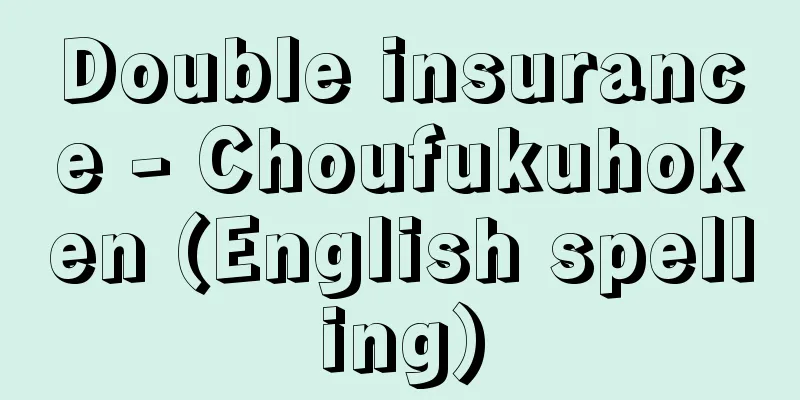Double insurance - Choufukuhoken (English spelling)

|
In non-life insurance, this refers to the case where insurance contracts are concluded with multiple insurers for the same insured interest, the same risk, and the same insurance period, and the total amount of the insured amount exceeds the insured value. In overlapping insurance, the insured amount of each insurance contract does not exceed the insured value, but when the insurance contracts with two or more insurers are considered as a whole, the total amount of the insured amount exceeds the insured value. Therefore, even if each contract itself is not excess insurance, if all of them are valid, it will end up going against the purpose of the law that prohibits excess insurance. Therefore, the Commercial Code stipulates that if several contracts are concluded at the same time (simultaneous overlapping insurance), each insurer is liable in proportion to the insured amount of each insurer (pro rata principle), and if they are concluded at different times (different overlapping insurance), in principle, the later insurer is liable for the amount remaining after subtracting the insured amount of the previous insurance contract from the insured value (priority principle) (Commercial Code Articles 632 and 633). The provisions of the Commercial Code are based on the premise that insurance contracts in which the total amount of insurance claims exceeds the insured value are invalid. However, doubts were raised about the Commercial Code's provision that distinguishes the content of the insurer's liability for insurance claims payment based on the time of the conclusion of the insurance contract and that makes contracts in which the excess amount is uniformly invalid. Therefore, the Insurance Act completely revised the provisions of the Commercial Code. That is, (1) the distinction between simultaneous and different overlapping insurance is abolished, (2) on the premise that contracts in which the total amount of insurance claims exceeds the insured value are also valid, (3) each insurer is responsible for paying the entire amount of damages that should be indemnified under its own contract (independent liability principle), and (4) when one of the insurers pays insurance claims in excess of its own share, it may seek compensation from the other insurers for the excess amount paid (Insurance Act, Article 20). This can be illustrated using numbers as follows: For an insured property with an insured value of 10 million yen, insured amounts of 10 million yen for Y1 , 6 million yen for Y2 , and 4 million yen for Y3 , if a total loss of 10 million yen occurs, (1) the amount of insurance payable will be 10 million yen for Y1 , 6 million yen for Y2 , and 4 million yen for Y3 . (2) The share of each insurer's burden will be 5 million yen for Y1 (10 million yen x 10 million yen / 20 million yen = 5 million yen), 3 million yen for Y2 (10 million yen x 6 million yen / 20 million yen = 3 million yen), and 2 million yen for Y3 (10 million yen x 4 million yen / 20 million yen = 2 million yen). (3) When Y1 has paid the insurance benefit of 10 million yen, the insured can no longer make a claim against Y2 or Y3 , and (4) Y1 can claim reimbursement of 3 million yen from Y2 (5 million yen x 3 million yen / 5 million yen = 3 million yen) and 2 million yen from Y3 (5 million yen x 2 million yen / 5 million yen = 2 million yen) for the 5 million yen that he paid in excess of his share of the burden. [Takuji Kaneko and Mitsuo Sakaguchi] [Reference] | | |Source: Shogakukan Encyclopedia Nipponica About Encyclopedia Nipponica Information | Legend |
|
損害保険において、同一の被保険利益、同一の危険、同一の保険期間につき複数の保険者と保険契約を締結し、その保険金額の合計額が保険価額を超過した場合をいう。重複保険においては、それぞれの保険契約の保険金額は保険価額を超過していないが、二つ以上の保険者との保険契約を全体としてみると、保険金額の合計額が保険価額を超過している場合であるから、たとえ各契約自体は超過保険でなくとも、これを全部有効とするときは、結果において、超過保険を禁止せんとする法の趣旨に反することになる。そこで商法は、数個の契約を締結したのが同時であれば(同時重複保険)、各保険者は各自の保険金額の割合で責に任じ(按分(あんぶん)主義)、時が違えば(異時重複保険)、原則として、後の保険者は、保険価額から前の保険契約の保険金額を引いた残額につき責に任ずべきもの(優先主義)としている(商法632条・633条)。 商法の規定は、保険金額の合計額が保険価額を超える部分の保険契約が無効であるという前提にたっている。しかし、保険契約の締結時を基準として保険者の保険金支払責任の内容について区別を設けること、超過部分の契約を一律に無効とする商法の規定には疑問がもたれていた。そこで、保険法では商法の規定を全面的に改めた。すなわち、(1)同時異時重複保険の区別を廃止し、(2)保険金額の合計額が保険価額を超過する部分の契約も有効であることを前提として、(3)各保険者は自己の契約により填補(てんぽ)すべき損害額の全部について支払責任を負い(独立責任額全額主義)、(4)保険者のうちの1人が自己の負担部分を超えて保険金を支払ったときは、その超えて支払った部分について他の保険者に対しその負担部分について求償することができる(保険法20条)。 これを数字を用いて示すと次のようになる。保険価額1000万円の保険の目的物について、保険金額が、Y1が1000万円、Y2が600万円、Y3が400万円の保険契約において1000万円の全損が生じたときは、(1)支払うべき保険金の額は、Y1が1000万円、Y2が600万円、Y3が400万円となる。(2)各保険者の負担部分は、Y1が500万円(1000万円×1000万円/2000万円=500万円)、Y2が300万円(1000万円×600万円/2000万円=300万円)、Y3が200万円(1000万円×400万円/2000万円=200万円)となる。(3)Y1が1000万円の保険金を支払ったときは被保険者はもはやY2、Y3に請求することはできず、(4)Y1は自己の負担部分を超えて支払った500万円につき、Y2に300万円(500万円×300万円/500万円=300万円)、Y3に200万円(500万円×200万円/500万円=200万円)を求償することができる。 [金子卓治・坂口光男] [参照項目] | | |出典 小学館 日本大百科全書(ニッポニカ)日本大百科全書(ニッポニカ)について 情報 | 凡例 |
Recommend
Carnot's theorem
Of heat engines operating between two heat sources...
Fundamental disequilibrium
The International Monetary Fund (IMF) is a non-pro...
Nikolay Aleksandrovich Berdyaev
Russian religious philosopher. Born into a milita...
I Ching - Ekigaku
A hermeneutic of the Book of Changes, one of the ...
Sayama
[1] [noun] ("sa" is a prefix) A small mo...
Snowdon [mountain] - Snowdon
Located in the northwest of Wales, it is the highe...
natura morta (English spelling) naturamorta
...Although it is not uncommon for small living a...
Nishiizu [town] - Nishiizu
A town on the west coast of the Izu Peninsula in K...
Henri-François d'Aguesseau
1668‐1751 French jurist and politician. He was app...
Pernet-Ducher, J.
...This rose had the year-round flowering charact...
Juḥā (English spelling)
An Arab witty figure from the early Islamic period...
Shigekuni Ujiie
...A powerful clan based in Katsuyama Castle in U...
Eugen [Duke of Savoy] - Eugen
Austrian general. Born in Paris, he was not employ...
Cranial nerves
Nerves that enter and exit the brain. That is, th...
Shonai Plain - Shonai Heiya
An alluvial plain in northwest Yamagata Prefectur...









